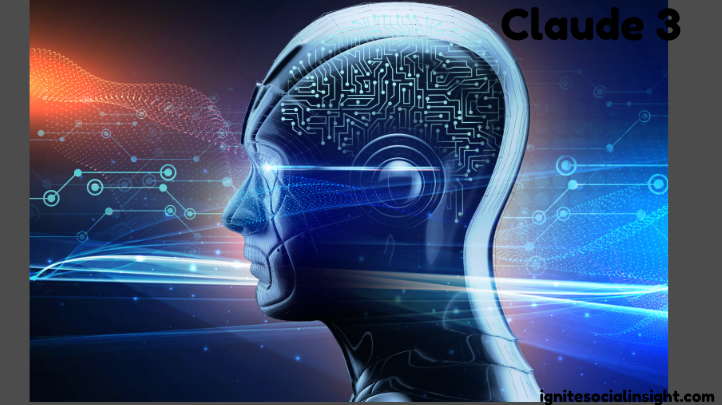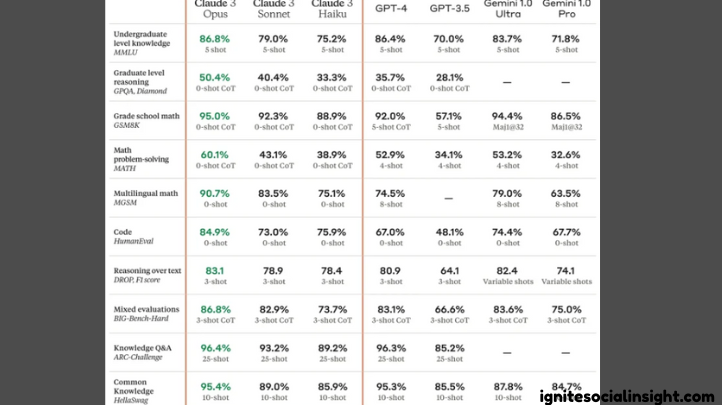
The Dawn of Claude 3 made by Anthropic promises much. It will be faster smarter and able to understand images and PDFs. It is designed to handle tough problems write better content and offer safer AI use. But is it truly groundbreaking or another hyped up launch?
As someone who works with AI daily I have seen both hits and misses. When I first tried Claude 3 I tested its limits with tricky math writing tasks and PDF analysis. To my surprise, it gave accurate answers. It handled tasks better than I expected.
The big question remains: Can Claude 3 meet our high expectations and transform our use of AI? Only time will tell.
Imagine an AI that adapts to your needs. It could help with a business, a creative project, or complex data analysis. The Dawn of Claude 3 is not one model it is a suite of three, each designed for specific tasks. Here is what makes each pillar of this system unique:
Haiku is the speedster of the group. It is light, fast, and cost effective perfect for tasks where time is of the essence. For instance, I once tested Haiku on live multilingual queries. A customer asked a question in French. Within seconds Haiku translated it and answered in detail. It is the go to model for real-time support, content moderation, and translation. It does all this while keeping costs low.
strikes the perfect balance between speed and intelligence. It is the dependable choice for businesses that need a multitasking powerhouse. I have used it to analyze big datasets. It found insights for marketing strategies. Once it made a week’s worth of email campaigns. We personalized them for different customer segments. It did this in the afternoon. The sonnet is the steady workhorse. It writes code, forecasts sales, and analyzes trends.
Opus is the genius of the family. It aims for deep understanding and creativity. It tackles complex tasks with ease. I have worked with Opus on research projects. It summarized complex papers and suggested new angles for exploration. Once it even helped me draft a script for a training video. It harmoniously blended humor and professionalism. If you need near-human understanding and some creativity, use Opus. It is your perfect partner.
These three models make a strong, flexible AI system. It offers custom solutions for various challenges. Whether you need speed, balance, or brilliance Claude 3 delivers.

Claude 3 redefines AI. It can handle text, images, and PDFs without interruptions. I tested it with a dense PDF full of charts. It gave a full summary of the key points. They provided a clear explanation of the visuals. It saved me hours.
Its deep reasoning is impressive in the same way. When I needed help with a strategy, Claude 3 broke it into clear steps. It offered insights like a personal advisor.
This aligns with Anthropic’s vision for safe ethical AI. The Dawn of Claude 3 is powerful. It is also practical, trustworthy, and accessible to all.
As AI evolves, the question of safety becomes more pressing. Anthropic recognizes this and has taken big steps to make Claude 3 a responsible and secure tool. They have built safeguards to stop the spread of harmful content. They aim to prevent misuse, such as generating dangerous or unethical material.
One feature that stands out is their focus on reducing bias. AI often reflects the biases in its training data. But Claude 3 eliminates them. The Anthropic Constitutional AI approach plays a key role here. Claude 3 aims to produce fair, accurate, and transparent results. It will do this by following its ethical guidelines.
From my experience, working with AI, transparency is critical for trust. When I first tested the Dawn of Claude 3 it had a more neutral tone and a structured quality than earlier models. It is refreshing to see how these efforts make it easier to trust the content it generates.
By addressing bias and safety from the start Anthropic is not making a better AI. They are setting the standard for ethical AI in a fast-changing world.

Claude 3 makes many promises. But how does it compare to OpenAI GPT4 and Google new Gemini models? Anthropic says Claude 3 is the fastest and most flexible AI. It can handle large inputs like whole documents and datasets. That is impressive especially for tasks like legal reviews or data analysis.
But, here’s where it gets tricky. Anthropic claims to focus on models with public benchmarks. This leaves out newer competitors like Google Gemini 1.5 Pro which has not released its full specs yet. It is like comparing runners when you have not seen everyone times yet.
From personal experience Claude 3 works well in workflows. It is great for summarizing reports and creating content. But beyond raw metrics other factors matter too. How easy is it to use daily? Can it adapt to unique business needs? These practical elements often make or break an AI tool’s usefulness.
Claude 3 sets a new standard. But its real test is its performance in diverse real world scenarios. Competition pushes innovation and that is what makes this space so exciting to watch.
Claude 3 is shaping up to be a game changer in AI bringing smarter faster tools to help in many areas. From education to healthcare its potential feels limitless. It could help teachers make better lesson plans. It could assist doctors in analyzing data faster. Check out IBM’s new Power S1012. It sets new standards in computing and AI performance.
One feature I am excited about is its future Tool Use. Imagine an AI that can write code. You could focus on your big ideas. Or it could handle repetitive tasks and free up your time. I have seen how AI helps people work smarter. It’s inspiring to think about how much more Claude 3 can offer.
But it is not about the tech; it is also about the responsible use of it. Ethics must guide AI ensuring fairness and avoiding harm. As The Dawn of Claude 3 grows it is important to keep human needs at the center. The future of AI is not about what it can do it is about how it can make our lives better.
Deciding if Claude 3 is right for you depends on what you need it to do. If you need a fast AI for simple tasks try Haiku. It can write product descriptions and answer questions.
For businesses that need a blend of speed and smarts Sonnet might be the best fit. It must sort data and automate sales.
If your work involves complex tasks Opus could help. It can handle research and analyze financial data.
I remember when I first tried out different AI tools. Claude 3 impressed me with how much faster and smarter it is compared to other models I have used. It made my work easier especially when I needed quick answers or needed to process a lot of information.
So are you ready to use Claude 3 to help you in your work? Remember the future is not something that happens it is something we build. With tools like Claude 3, we can create a future full of new opportunities and ideas.
As AI continues to evolve it is exciting to see how tools like The Dawn of Claude 3 will change the way we work and think. The future is bright and with Claude 3 you are stepping into it.